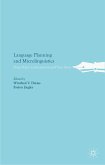This study first establishes the discriminatroy and elitist nature of standard languages and standardisation itself, considering as counter-example the case of Sri Lankan English as symptomatic of the 'other' or postcolonial Englishes. On the basis of this understanding of the standard, while at the same time, accepting the necessity of standards, however attenuated, the writer argues for the active broadening of the standard to include the greatest variety possible - privileging 'meaning' over other rules - and holds that this would in fact work towards extending the bounds of linguistic tolerance.
Bitte wählen Sie Ihr Anliegen aus.
Rechnungen
Retourenschein anfordern
Bestellstatus
Storno








